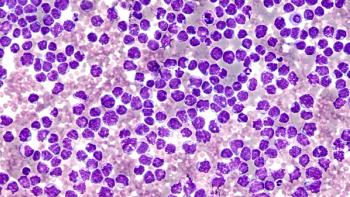
Providers
Latest News

RAINBOWFISH Results Highlight Risdiplam as Effective Treatment for Presymptomatic SMA
Latest Videos

CME Content
More News

Results from the AiDAPT trial show hybrid closed-loop therapy significantly improves maternal glycemic control during pregnancy complicated by T1D.

Researchers have developed a new line method (NLM) that showcased benefits for genetic screening in spinal muscular atrophy (SMA).

Researchers identified an optimal early relapse time point to incorporate into traditional risk features and formed a novel prognostic classification utilizing both static and dynamic risk.

Melissa Levine, MD, a family medicine specialist at Arizona Community Physicians and medical director for the Abacus Health accountable care organization (ACO), discussed strategies for succeeding in an ACO and how primary care can complement oncology care for patients with cancer.

This comprehensive comparative analysis examined the economic and health care resource utilization implications of initiating glucocorticoid and exon-skipping therapy for Duchenne muscular dystrophy (DMD).

The location of integration of a gene therapy has been crucial for the safety and efficacy of the treatment to cure infants with X-linked severe combined immunodeficiency.

The ranibizumab biosimilar was the first in ophthalmology to the US market in 2022, but its competition has already had a year of interchangeability exclusivity.

Uptitration of renin-angiotensin-aldosterone system (RAAS) inhibitors was less successful in women than men with acute heart failure (AHF), especially in those with HF with reduced ejection fraction.

Researchers used real-world data to further validate the use of selexipag in the management of pulmonary arterial hypertension (PAH).

A phase 3, randomized, parallel-group trial showcased the efficacy of internet-based cognitive behavioral therapy (iCBT) for combatting depressive symptoms brought on by multiple sclerosis (MS).

Miriam J. Atkins, MD, FACP, president of the Community Oncology Alliance, discusses the challenges facing oncology today, such as physician and nurse recruitment and minority clinical trial enrollment.

MARIPOSA demonstrated the combination reduced risk of progression or death by 30% compared with osimertinib. MARIPOSA-2 found amivantamab plus chemotherapy and amivantamab plus chemotherapy and lazertinib also improved progression-free survival (PFS) over chemotherapy after progression on osimertinib.

Helen Shih, MD, MS, MPH, FASTRO, Massachusetts General Hospital, weighs the risks and benefits of treating or postponing treatment of low-grade gliomas.

At the 2023 COA Payer Exchange Summit being held October 23-24 in Reston, Virginia, Lalan Wilfong, MD, US Oncology Network, emphasizes the importance of oncology care equity, ensuring continuity of care, and enhancing care coordination.

Tina Cascone, MD, PhD, of the University of Texas MD Anderson Cancer Center, discusses the impact of the CheckMate 77T study on the treatment approach for non–small cell lung cancer (NSCLC).

Datopotamab deruxtecan not only demonstrated a statistically significant improvement over chemotherapy for breast cancer and docetaxel for non–small cell lung cancer (NSCLC), but the intervention therapy had less toxicity.

The first-of-its-kind Aurora EV-ICD system offers a single-device, single procedure with a lead placed outside of the heart and veins.

A pooled analysis with nearly 3 years of follow-up showed better outcomes when zanubrutinib was given in the second line vs later lines of therapy in patients with relapsed or refractory (R/R) mantle cell lymphoma (MCL).

The FDA’s decision to allow at-home dosing of intransal foralumab for patients with multiple sclerosis is likely to improve patient compliance to treatment and health outcomes, according to a recent release statement.

Recognizing that skin diseases such as atopic dermatitis, psoriasis, and hidradenitis suppurativa present differently in skin of color can prevent delays in diagnosis and treatment, explained James Song, MD, director of clinical research and associate chief medical officer at Frontier Dermatology.

Clinical-grade, expert-supported natural language processing (NLP) is valuable to payers and providers when exchanging patient information through continuity-of-care documents.

Thomas Powles, MD, MBBS, MRCP, from Barts Cancer Centre, shares insights from the EV-302/KEYNOTE-A39 trial and its implications for the future of enfortumab vedotin and pembrolizumab (EV+P) combination therapy for urothelial carcinoma.

Enfortumab vedotin plus pembrolizumab not only beat chemotherapy in the first-line setting for locally advanced metastatic urothelial cancer for the first time in decades, but it nearly doubled progression-free survival and overall survival vs chemotherapy.

Regardless of presence of brain metastases, patients with HER2-mutant (HER2m) non–small cell lung cancer (NSCLC) showed systemic responses to trastuzumab deruxtecan. In addition, the therapy showed intracranial efficacy to reduce the size of brain metastases.

The results of CheckMate 77T showcase the improved event-free survival for patients with resectable non–small cell lung cancer who receive nivolumab in both the neoadjuvant and adjuvant setting and may have practice-changing implications.

















